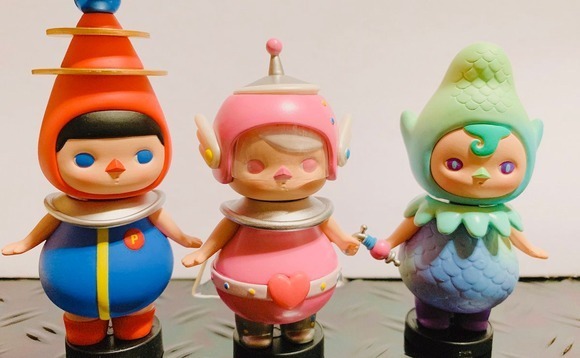
Deal focus: Pop Mart dominates China's dolls

Best known in China for the Molly series of fashion dolls, Pop Mart emerged as a leader before many others recognized the market potential. The Loyal Valley Capital-backed company is now preparing for an IPO
Chinese fashion doll retailer Pop Mart came to the attention of Lisa Ye, a partner at Loyal Valley Capital, through social media channels two years ago. But the question was whether it represented a sustainable trend.
It was only after attending two toy shows in Beijing and Shanghai – a standard follow-up to an initial meeting with the company – that Ye realized how popular Pop Mart had become among young people. She caught up with management again in early 2019, discovered that sales and profit for the previous year had exceeded forecasts, and the wheels started turning. Loyal Valley recently led a $100 million pre-IPO round for the company.
"Pop Mart has become a symbol of China's fashion toy industry. It alone has more than half the market share," says Ye.
Pop Mart recorded revenue of RMB161 million ($23 million) for the first half of 2018, up 156% year-on-year. Net profit was RMB21 million with a gross margin of 60%, according to filings on China's National Equities Exchange & Quotations (NEEQ) – or New Third Board – where the company traded from 2017 until its delisting last year. During the country's most recent November 11 Single's Day shopping festival, sales on Alibaba Group's Tmall platform amounted to RMB82 million, up 295% year-on-year.
But rapid growth isn't the product of high cash burn and high marketing expenditure, insists De Si, Pop Mart's co-founder. "We control our growth rate and our marketing cost is low," he tells AVCJ. "Moving too quickly can create problems in areas like customer service and supply chains."
As its name suggests, Pop Mart was founded – in 2010 – as a supermarket for young people, inspired by Log-On, a subsidiary of Hong Kong's CitySuper. It had 10,000 stock keeping units (SKUs) covering all kinds of lifestyle products. Four years in, it turned out that sales growth was especially high for designer toys because customers were actively discussing the products on the company's Sina Weibo and WeChat accounts. "This was unusual. You wouldn't expect a Watsons customer to inform the retailer of their latest purchase. It was an untouched market segment, and we decided to plunge in," says Si.
Changing tack
Pop Mart pivoted in 2015, reducing its SKUs to around 1,000 and concentrating on toys. Ning Wong, the company's other co-founder, made a key breakthrough by reaching out to Hong Kong designer Kenny Wong and launching the enduringly popular Molly series of dolls. Taking inspiration from the architecture of Beijing's Forbidden City, Wong inserted characteristics of traditional Chinese creatures into the classic Molly persona of a Western girl with golden hair and blue eyes. This led to an entire "Journey to the West"-style series.
The company operates under a blind box model: customers can buy a full set of 12 dolls for RMB708 ($100) or an individual doll without knowing which one. According to Si, the typical customer stays in the store for a long time, trying their luck by purchasing one blind box after another. There is a vibrant online community – including sites such as Paqu – based on exchanging duplicates. Individual Pop Mart stores have their own WeChat groups as well to help fulfill the same purpose.
However, Ye stresses that intellectual property underpins Pop Mart's success. "It has built a commercial closed-loop process from IP incubation to factory production, from online and offline sales to content communities. That's why it the margins are so high," she says.
The company has 30 factories, 140 stores and 900 vending machines, but the starting point – and major barrier to entry – is exclusive collaborations with IP owners and a 100-strong design team that comes up with new ideas. These ideas capture the public's imagination, facilitating a change in the adoption threshold from expensive hand-made toys to factory-produced items.
Pop Mart already has distributors in 21 markets, with vending machines launched in South Korea and Singapore and stores set to follow this year. Si wants to continue this international push and he is on the lookout for new IP to support this effort. In recent months, contracts have been signed with drink brand Fanta and chocolate producer Dove.
Latest News
Asian GPs slow implementation of ESG policies - survey
Asia-based private equity firms are assigning more dedicated resources to environment, social, and governance (ESG) programmes, but policy changes have slowed in the past 12 months, in part due to concerns raised internally and by LPs, according to a...
Singapore fintech start-up LXA gets $10m seed round
New Enterprise Associates (NEA) has led a USD 10m seed round for Singapore’s LXA, a financial technology start-up launched by a former Asia senior executive at The Blackstone Group.
India's InCred announces $60m round, claims unicorn status
Indian non-bank lender InCred Financial Services said it has received INR 5bn (USD 60m) at a valuation of at least USD 1bn from unnamed investors including “a global private equity fund.”
Insight leads $50m round for Australia's Roller
Insight Partners has led a USD 50m round for Australia’s Roller, a venue management software provider specializing in family fun parks.








